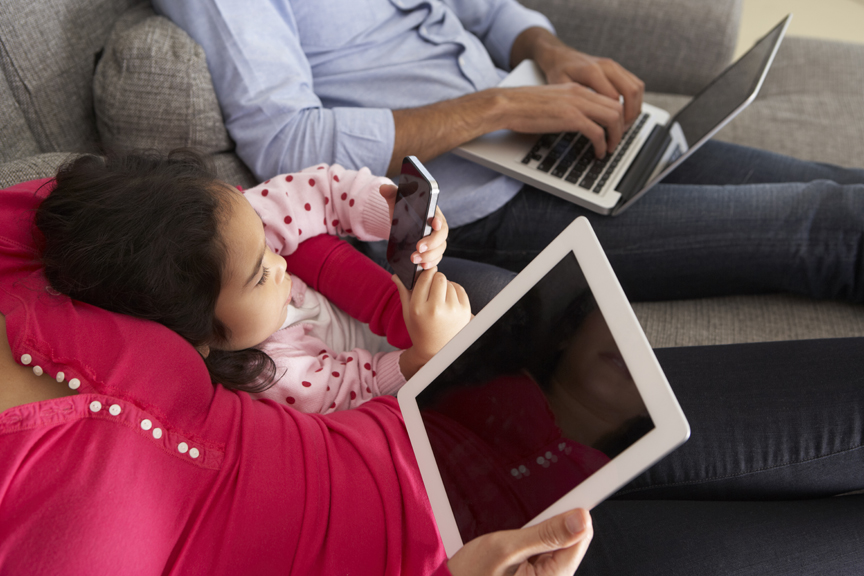- Behavior
- Education
- Parenting
How much screen time is the right balance for my child?

In this article, you’ll find answers to questions like:
1. What do national experts recommend?
2. What are some tips?
3. Who can give local advice?
We’ve all seen it. A toddler – learning her shapes and colors – logs into a smartphone, taps the app icon that plays her favorite tunes and claps along with joy.
Is this good or bad? It depends, experts say.
1. WHAT DO NATIONAL EXPERTS RECOMMEND?
Recognizing the struggle many parents have managing their children’s screen time, the American Academy of Pediatrics released two policy statements: "Media and Young Minds" involving preschool ages and "Media Use in School-Age Children and Adolescents." The academy urges parents to be their children's "media mentor" and teach them how to use the devices to create, connect and learn.
Palm Beach Circuit Court Judge James Martz, who previously served in the juvenile division and was on the board of Children's Services Council of Palm Beach County, agrees. "A digital screen is not a litmus test for a child's thoughts," he says. "A parent-and-child conversation is so much more enlightening as to where a child's head is at."
2. WHAT ARE SOME TIPS?
There’s no escaping our digital world, so here is advice from the pediatrics academy to help guide you:
- For children younger than 18 months, avoid screen media other than video chatting. Parents of children 18 to 24 months who want to introduce digital media should choose high-quality programming and watch it with their children to help them understand it.
- With very young children, stick to unstructured play and human interaction instead of screen time. The opportunity to think creatively, solve problems and develop reasoning and motor skills is more valuable for their rapidly developing brain than passive media intake.
- For children ages 2 to 5 years, limit screens to one hour a day of high-quality programs. Parents should watch media with children to help them understand it and apply it to the world around them.
- Keep the computer and other screens in a common area to monitor your kids online.
- Look for media choices that are educational, teach values such as empathy, racial and ethnic tolerance, and that model good interpersonal skills.
- For children ages 6 and older, place consistent limits on media time as well as the types of media.
- Become familiar with social media sites like Facebook, TikTok, Instagram and Snapchat. Even better, create your own profiles so you can "friend" your kids and monitor them.
- Designate media-free times together, such as dinner or driving, as well as media-free locations at home, such as bedrooms.
- Initiate discussions about online citizenship and safety, including treating others with respect online and offline.
3. WHO CAN GIVE LOCAL ADVICE?
Triple P, the Positive Parenting Program funded by Children’s Services Council, helps parents find the right balance with screen time. To learn more about Triple P, call:
- Community Partners of South Florida: 561-841-3500, ext. 1087
- Center for Family Services of Palm Beach County: 561-616-1222
SOURCES:
• Judge James Martz, Fifteenth Judicial Circuit Court of Florida
• American Academy of Pediatrics
• Common Sense Media
You May Also Like
-
- Behavior
- Parenting
- Safety
Never too early to protect your young child in the cyber world
Talk with children about online dangers the same way you would about drugs and alcohol or driving a car, local experts advise. …
Read More -
- Behavior
- Parenting
- Safety
How can my middle schooler avoid peril in the cyber world?
In middle school, children can spend more unsupervised time on the internet. And that means parents must sharpen their watchful eye. Read on for more insight and advice from our lo …
Read More -
- Behavior
- Parenting
- Safety
How can I protect my teen from trouble in the cyber world?
On popular social media hubs, such as Snapchat and Instagram, children might share inappropriate photos and experience cyberbullying. Find out from our local experts how you can be …
Read More
Related resources
-
- Health
- Parenting
American Academy of Pediatrics
HealthyChildren.org, a parenting website with children's health and development information, backed by 67,000 pediatricians
630-626-6000 Website Email -
- Health
- Parenting
- Safety
Children's Services Council of Palm Beach County
Provides research, funding and services for children to grow up healthy, safe and strong
561-740-7000 Website -
- Behavior
- Parenting
- Safety
Common Sense Media
Information to help families make smart tech-related decisions.
415-863-0600 Website -
- Other
- Parenting
- Safety
National Center for Missing & Exploited Children
NetSmartz — interactive website that teaches kids and teens how to make safer choices online
800-843-5678 Website
